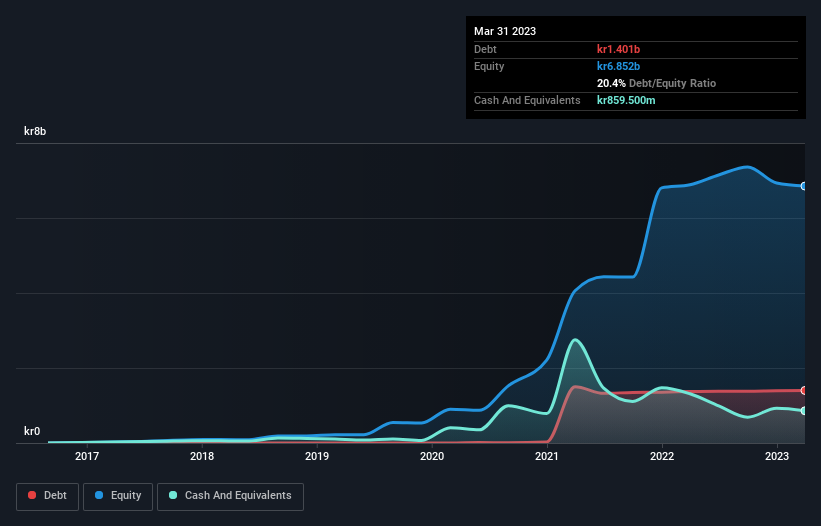Warren Buffett famously said, 'Volatility is far from synonymous with risk.' So it seems the smart money knows that debt - which is usually involved in bankruptcies - is a very important factor, when you assess how risky a company is. We can see that BICO Group AB (publ) (STO:BICO) does use debt in its business. But the real question is whether this debt is making the company risky.
Why Does Debt Bring Risk?
Generally speaking, debt only becomes a real problem when a company can't easily pay it off, either by raising capital or with its own cash flow. If things get really bad, the lenders can take control of the business. However, a more usual (but still expensive) situation is where a company must dilute shareholders at a cheap share price simply to get debt under control. By replacing dilution, though, debt can be an extremely good tool for businesses that need capital to invest in growth at high rates of return. When we think about a company's use of debt, we first look at cash and debt together.
View our latest analysis for BICO Group
What Is BICO Group's Debt?
The chart below, which you can click on for greater detail, shows that BICO Group had kr1.40b in debt in March 2023; about the same as the year before. However, it does have kr859.5m in cash offsetting this, leading to net debt of about kr541.4m.

A Look At BICO Group's Liabilities
We can see from the most recent balance sheet that BICO Group had liabilities of kr860.3m falling due within a year, and liabilities of kr2.33b due beyond that. Offsetting this, it had kr859.5m in cash and kr648.6m in receivables that were due within 12 months. So it has liabilities totalling kr1.68b more than its cash and near-term receivables, combined.
This deficit is considerable relative to its market capitalization of kr2.75b, so it does suggest shareholders should keep an eye on BICO Group's use of debt. This suggests shareholders would be heavily diluted if the company needed to shore up its balance sheet in a hurry. When analysing debt levels, the balance sheet is the obvious place to start. But ultimately the future profitability of the business will decide if BICO Group can strengthen its balance sheet over time. So if you want to see what the professionals think, you might find this free report on analyst profit forecasts to be interesting.
In the last year BICO Group wasn't profitable at an EBIT level, but managed to grow its revenue by 42%, to kr2.5b. With any luck the company will be able to grow its way to profitability.
Caveat Emptor
Even though BICO Group managed to grow its top line quite deftly, the cold hard truth is that it is losing money on the EBIT line. Its EBIT loss was a whopping kr439m. Considering that alongside the liabilities mentioned above does not give us much confidence that company should be using so much debt. Quite frankly we think the balance sheet is far from match-fit, although it could be improved with time. Another cause for caution is that is bled kr643m in negative free cash flow over the last twelve months. So in short it's a really risky stock. When analysing debt levels, the balance sheet is the obvious place to start. However, not all investment risk resides within the balance sheet - far from it. To that end, you should learn about the 3 warning signs we've spotted with BICO Group (including 1 which doesn't sit too well with us) .
At the end of the day, it's often better to focus on companies that are free from net debt. You can access our special list of such companies (all with a track record of profit growth). It's free.
Valuation is complex, but we're here to simplify it.
Discover if BICO Group might be undervalued or overvalued with our detailed analysis, featuring fair value estimates, potential risks, dividends, insider trades, and its financial condition.
Access Free AnalysisHave feedback on this article? Concerned about the content? Get in touch with us directly. Alternatively, email editorial-team (at) simplywallst.com.
This article by Simply Wall St is general in nature. We provide commentary based on historical data and analyst forecasts only using an unbiased methodology and our articles are not intended to be financial advice. It does not constitute a recommendation to buy or sell any stock, and does not take account of your objectives, or your financial situation. We aim to bring you long-term focused analysis driven by fundamental data. Note that our analysis may not factor in the latest price-sensitive company announcements or qualitative material. Simply Wall St has no position in any stocks mentioned.
About OM:BICO
BICO Group
Provides hardware, laboratory automation, and software solutions in North America, Europe, Asia, and internationally.
Excellent balance sheet and good value.
Similar Companies
Market Insights
Community Narratives




